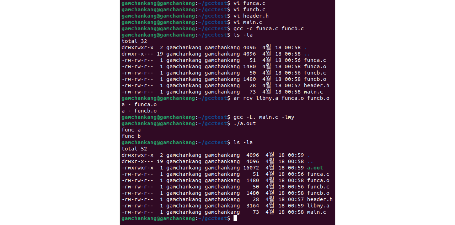리눅스 gcc(linux gcc) 1. compile
1. basic compile
1-1 C workflow

1) compile
source file(.c) + header file(.h) = object file(.o)
1 source file => 1 object file
2) link object files
3) link with static libraries
4) link with shared libraries
5) execute or debug
1-2 compile command
direct
gcc file.c
result: create a.out
create object file
gcc -c file.c
result: create file.o
gcc -o file file.o
result: create file(executable file)
2. library
2-1 static lib vs shared lib
| static lib | shared lib | |
| included in: | compile | runtime(when needed) |
| suffix | .a | .so |
executable file size including static lib is bigger than shared lib.
3. macro
3-1 define macro
able to define undefined macro in source file with,
gcc -DVAR_NAME=VALUE file.c
3-2 conditional compile
make condition for check macro defined in source file with,
#ifdef MACRO
...
#endif
4. add header/lib
4-1 add standard lib
gcc file.c -lname
standard lib is libname.a in /usr/include/
4-2 add user header
gcc -I. file.c
include all header(.h) in current directory
gcc -L. file.c
include all lib(.a or .so) in current directory
5. create static lib
ar rcv lib_name.a objfile1.o objfile2.o ...
make lib_name.a lib with objfile1.o + objfile2.o + …
* only with obj file
* if command gcc -L. without including header,
ar t lib_name.a
print all obj file in lib_name.a





Leave a comment